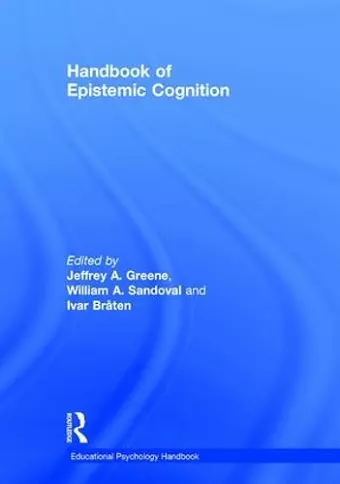Handbook of Epistemic Cognition
Jeffrey A Greene editor William A Sandoval editor Ivar Bråten editor
Format:Hardback
Publisher:Taylor & Francis Ltd
Published:4th Feb '16
Currently unavailable, and unfortunately no date known when it will be back
This hardback is available in another edition too:
- Paperback£120.00(9781138013421)

The Handbook of Epistemic Cognition brings together leading work from across disciplines, to provide a comprehensive overview of an increasingly important topic: how people acquire, understand, justify, change, and use knowledge in formal and informal contexts. Research into inquiry, understanding, and discovery within academic disciplines has progressed from general models of conceptual change to a focus upon the learning trajectories that lead to expert-like conceptualizations, skills, and performance. Outside of academic domains, issues of who and what to believe, and how to integrate multiple sources of information into coherent and useful knowledge, have arisen as primary challenges of the 21st century.
In six sections, scholars write within and across fields to focus and advance the role of epistemic cognition in education. With special attention to how researchers across disciplines can communicate and collaborate more effectively, this book will be an invaluable resource for anyone interested in the future of knowledge and knowing.
Dr. Jeffrey A. Greene is an associate professor of Learning Sciences and Psychological
Studies in the School of Education at the University of North Carolina at Chapel Hill.
Dr. William A. Sandoval is a professor in the division of Urban Schooling at
the UCLA Graduate School of Education & Information Studies.
Dr. Ivar Bråten is a professor of Educational Psychology at the Faculty of Educational
Sciences at the University of Oslo, Norway.
"The editors have done a masterful job bringing some cohesion to the disparate domains of epistemic beliefs, values, reasoning, practices, and cognition. The Handbook of Epistemic Cognition is an embracing conversation across contributions that is sure to stimulate richer scholarly engagements on how knowledge and knowing impact thinking and reasoning, and inform learning and teaching. The chapter and summary presentations reveal perplexing and persistent differences regarding methods and meanings and about what counts as evidence for things epistemic that will stimulate basic and applied research in the cognitive and learning sciences."
--Richard A Duschl, Waterbury Chair Professor, Pennsylvania State University, USA
"This book offers the most comprehensive coverage I have seen of this important topic. It will be a valuable handbook to those seeking to bring investigation of how we know and understand knowing to its rightful place at the center of cognition and cognitive development research."
--Deanna Kuhn, Professor of Psychology and Education, Teachers College, Columbia University, USA
"The Handbook of Epistemic Cognition presents a constructively critical tour of theory, empirical findings, and methods for researching how people view the ways they generate and validate knowledge. If you’re an educator, a research psychologist or someone who wants to understand why you believe what you do about history, science or health, this book will be an important resource."
--P.H. Winne, Professor and Canada Research Chair, Simon Fraser University, Canada
"‘Epistemic cognition’ is a concept and research agenda about the knowledge we need for living in a complex world. This volume offers several very helpful maps for travelling the territories of research on the topic, and it demonstrates the import of epistemic cognition for learning in formal and informal learning-contexts."
--Rainer Bromme, Professor of Educational Psychology, University of Münster, Germany
"Handbook of Epistemic Cognition provides an overview on how people build, understand, modify and use knowledge in formal and informal contexts.
It also draws attention to the significance of clarifying the meaning of epistemic change in relation to instructional frameworks. Across the book, there is representation of a diversity of disciplines, types of reasoning and contexts of cognition which makes the book a fairly robust source of reference for anybody who would be interested in not only being introduced to epistemic cognition, but also in unpacking the foundational research that have contributed to the conceptualisation of epistemic cognition in a broad sense."
--Sibel Erduran, Science & Education (2019) 28:819–821
ISBN: 9781138013407
Dimensions: unknown
Weight: 1111g
530 pages